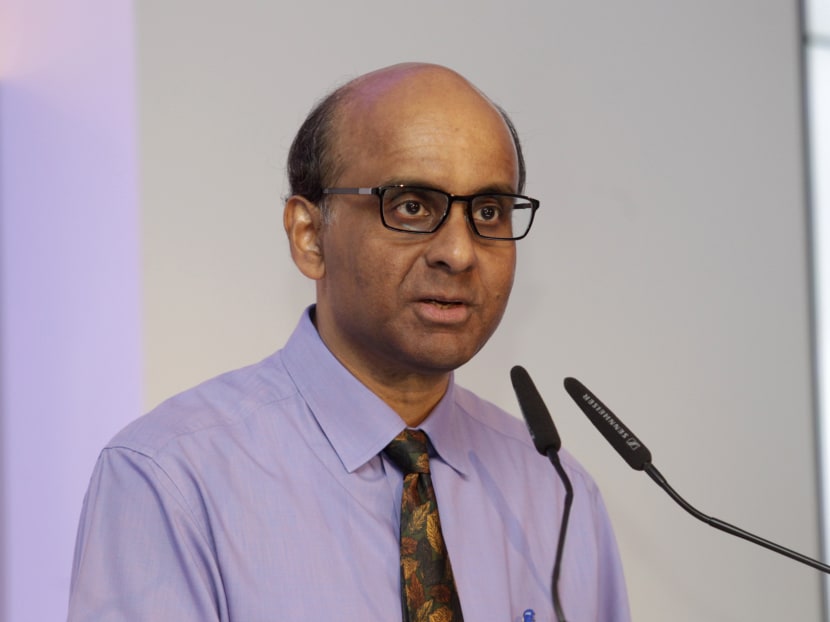Adopt ‘meritocracy through life’, Tharman urges S’pore
SINGAPORE — With advances in technology displacing more jobs and as Singapore works towards becoming an advanced economy, the Republic needs to adopt “meritocracy through life” to move into the next wave of development, said Deputy Prime Minister Tharman Shanmugaratnam yesterday.

Deputy Prime Minister and Minister for Finance Tharman Shanmugaratnam speaking at the official opening of Lifelong Learning Institute, Sept 17 2014. Photo: Wee Teck Hian
SINGAPORE — With advances in technology displacing more jobs and as Singapore works towards becoming an advanced economy, the Republic needs to adopt “meritocracy through life” to move into the next wave of development, said Deputy Prime Minister Tharman Shanmugaratnam yesterday.
“Not a meritocracy that is based on what you have achieved at 18 or 24, but a meritocracy through life, where you are assessed on your performance at every stage of your life, regardless of where you came from or where you started,” he said.
Mr Tharman was speaking at the official opening of the Lifelong Learning Institute at Paya Lebar, where he elaborated on the new SkillsFuture Council to be launched soon. The council, he said, will drive the process of ensuring that every Singaporean — whether a university, polytechnic or Institute of Technical Education (ITE) graduate — can advance in his or her career and be recognised on the basis of his or her skills.
Prime Minister Lee Hsien Loong first announced the setting up of this tripartite council during the National Day Rally last month, which will develop an integrated system of education, training and career progression for all Singaporeans. It will also promote industry support and social recognition for individuals to advance in his or her career based on skills.
Yesterday, Mr Tharman, who heads the council, said it would comprise representatives from the Government, employers and unions, educational leaders as well as individuals whose personal stories embody what the council aims to achieve. Beyond strengthening the polytechnic and ITE pathways, the Applied Study in Polytechnics and ITE Review (ASPIRE) has brought forward a broader issue. “We have to go beyond paper qualifications towards recognising that a whole set of skills matters in how well we perform,” he said.
This includes the ability to apply knowledge in real-world situations that keep changing and to develop deeper specialist know-how when needed. “That’s true about performance and career success in every field, and for every segment of our workforce, and whichever the qualifications we come from — whether degrees or diplomas or ITE certificates,” said Mr Tharman, who is also Finance Minister.
In his speech, Mr Tharman also noted Singapore has developed an education system that is among the “best-regarded internationally”.
The next phase of development would be to build a “first-rate” system of continuing education and training, which will intertwine education and work in ways that strengthen and enrich both, and also build an advanced economy and ensure a fair society, he said.
He noted that in advanced countries, automation has begun to replace human tasks — not only at the lower end of the skills spectrum, but across a broader swathe of jobs. The good jobs of the future will then involve both thinking and doing and constant learning, he said.
As Singapore moves towards becoming an advanced economy, Mr Tharman said the country needs to aspire to move beyond competence, towards mastering skills and respect such mastery of skills.
“It is really at the heart of an inclusive society. We must be a place where everyone has the opportunity to build on their strengths, developing the skills that enable them to maximise their potential, earn their own success and contribute to society,” he said.
Mr Tharman also called for the country to move beyond the simple divide between education and work; pre-employment education and post-employment training. “It’s too simple a divide because of the way technology is changing, jobs are changing and the way education must change,” he said.
Referring to the sectoral manpower framework to be developed under the new master plan unveiled by the Singapore Workforce Development Agency yesterday, Mr Tharman also cautioned against a “skills bureaucracy”. “We should not develop a skills bureaucracy to implement this. This is not going to be a top-down process. The employment market is too fluid for that, technology is changing too quickly,” he said.









